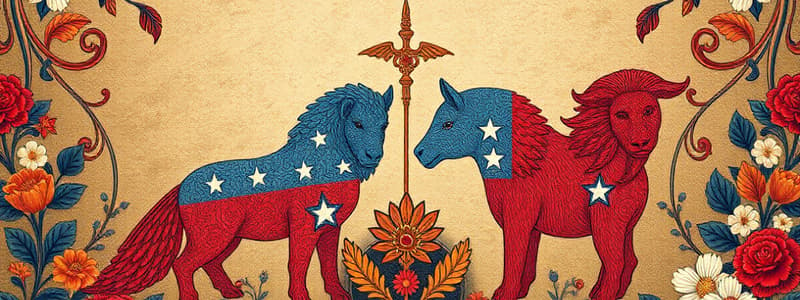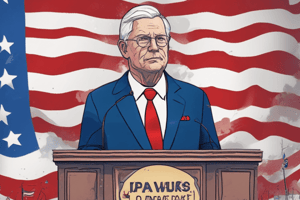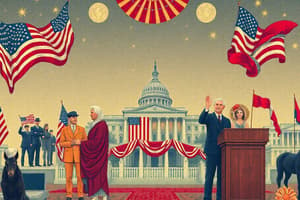Podcast
Questions and Answers
What is the primary goal of a political party?
What is the primary goal of a political party?
- To influence government policies and gain control over political offices (correct)
- To create a unified government
- To form alliances with foreign governments
- To encourage public debate on issues
Which two parties dominate the American political landscape?
Which two parties dominate the American political landscape?
- Progressive and Reform
- Libertarian and Independent
- Green and Socialist
- Democratic and Republican (correct)
What symbol represents the Democratic Party?
What symbol represents the Democratic Party?
- Lion
- Elephant
- Donkey (correct)
- Eagle
What event contributed to the adoption of the donkey as the symbol for the Democratic Party?
What event contributed to the adoption of the donkey as the symbol for the Democratic Party?
How did the elephant become associated with the Republican Party?
How did the elephant become associated with the Republican Party?
Why has America maintained a two-party system?
Why has America maintained a two-party system?
What is one function of political parties?
What is one function of political parties?
What is the typical Democratic belief regarding government involvement in the economy?
What is the typical Democratic belief regarding government involvement in the economy?
How do Republicans view individual responsibility in society?
How do Republicans view individual responsibility in society?
Which of the following best describes the Democratic stance on social issues?
Which of the following best describes the Democratic stance on social issues?
How do Democrats propose to handle entitlement programs compared to Republicans?
How do Democrats propose to handle entitlement programs compared to Republicans?
What are the contrasting views of Democrats and Republicans regarding environmental policy?
What are the contrasting views of Democrats and Republicans regarding environmental policy?
What conclusion is drawn about the principles and philosophies of both parties?
What conclusion is drawn about the principles and philosophies of both parties?
What is the primary purpose of interest groups as described?
What is the primary purpose of interest groups as described?
How do interest groups differ from political parties in terms of their focus?
How do interest groups differ from political parties in terms of their focus?
What role do Political Action Committees (PACs) play in the context of interest groups?
What role do Political Action Committees (PACs) play in the context of interest groups?
What techniques do lobbyists use to influence legislators?
What techniques do lobbyists use to influence legislators?
What is the definition of "suffrage" as mentioned?
What is the definition of "suffrage" as mentioned?
What is one reason why some Americans choose not to vote?
What is one reason why some Americans choose not to vote?
Flashcards
Suffrage
Suffrage
The right to vote in political elections.
Franchise
Franchise
The right to vote, similar to suffrage.
Voting Eligibility Requirements
Voting Eligibility Requirements
Factors that determine who can vote, including age, residency, and citizenship status.
Motor Voter Law
Motor Voter Law
Signup and view all the flashcards
Interest Groups
Interest Groups
Signup and view all the flashcards
Lobbying
Lobbying
Signup and view all the flashcards
Propaganda
Propaganda
Signup and view all the flashcards
Political Action Committee (PAC)
Political Action Committee (PAC)
Signup and view all the flashcards
Functions of Interest Groups
Functions of Interest Groups
Signup and view all the flashcards
Reasons for Nonvoting
Reasons for Nonvoting
Signup and view all the flashcards
What is a political party?
What is a political party?
Signup and view all the flashcards
What are the two main American political parties?
What are the two main American political parties?
Signup and view all the flashcards
What is the primary belief of Democrats regarding the Federal Government?
What is the primary belief of Democrats regarding the Federal Government?
Signup and view all the flashcards
How do Republicans view individual responsibility?
How do Republicans view individual responsibility?
Signup and view all the flashcards
What are some Democrat economic policies?
What are some Democrat economic policies?
Signup and view all the flashcards
What economic approach do Republicans prefer?
What economic approach do Republicans prefer?
Signup and view all the flashcards
How do Democrats and Republicans differ in their taxation policies?
How do Democrats and Republicans differ in their taxation policies?
Signup and view all the flashcards
What is the stance of Democrats on social issues?
What is the stance of Democrats on social issues?
Signup and view all the flashcards
What are the key differences in foreign policy perspectives between Democrats and Republicans?
What are the key differences in foreign policy perspectives between Democrats and Republicans?
Signup and view all the flashcards
What is the role of a minor party in the political landscape?
What is the role of a minor party in the political landscape?
Signup and view all the flashcards
Study Notes
Political Parties
- Political parties aim to achieve a particular goal
- The two major US political parties are Democrat and Republican
- Democrats are often associated with a donkey.
- Republicans are often associated with an elephant
- Political parties have several functions
- Minor parties influence political landscape
- The Federalist #10 warned about the dangers of factions, relating to parties
Democrats vs Republicans
- Democrats believe the federal government has a significant role in society
- Republicans emphasize individual responsibility
- Democrats support policies to strengthen the economy
- Republicans favor certain economic approaches
- Democrats and Republicans have different taxation policies for corporations
- Democrats tend towards liberal social views and individual choice
- Contrasting foreign policy perspectives exist between Democrats and Republicans
- Differences exist in how each party handles entitlement programs
- Democrats and Republicans hold contrasting environmental views
- A conclusion about both parties is provided
Interest Groups
- Interest groups aim to influence public policy
- They differ from political parties in focus and goals
- Interest groups can serve valuable functions in society
- Various reasons exist for people to join interest groups
- Interest groups attempt to influence public opinion
- Political Action Committees (PACs) are part of this structure
- Lobbying's role extends beyond legislative processes
- Techniques, like propaganda, influence legislators
- Different types of interest groups focus on specific areas
Voting Behavior
- Suffrage is the right to vote; franchise is related
- Voting eligibility requirements have changed
- State roles in voter qualifications are discussed
- The Motor Voter Law is outlined
- Reasons why some Americans choose not to vote are discussed
- Characteristics of voters and factors influencing voter turnout are analyzed
- The relationship between two-party competition and voter turnout are examined
- Party identification is a key influence on voting behavior
- There's a decline in people identifying with one party, with potential future effects
Studying That Suits You
Use AI to generate personalized quizzes and flashcards to suit your learning preferences.




